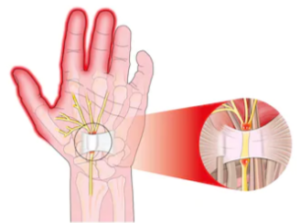
A twitching finger makes a person fear they have ALS because this disease causes twitching, so they’re hoping that the real cause is carpal tunnel syndrome.
Finger twitching is common. It can come out of the blue for no apparent reason, however, making a person wonder if it’s the first sign of ALS.
When a person thinks this way, you can bet they previously googled for information pertaining to finger twitching.
The ALS sites were on the first page of the results.
You then wonder what ELSE, that’s benign, could cause any kind of tremoring in a finger – and perhaps carpal tunnel syndrome has come to mind.
Can carpal tunnel syndrome, though, cause the tiny muscles in a finger to twitch?

Shutterstock/Alexonline
“Finger twitching (muscle fasciculation) is not a typical symptom of carpal tunnel syndrome,” says John-Paul H. Rue, MD, orthopedic sports medicine surgeon with Orthopedics and Joint Replacement at Mercy Medical Center in Baltimore, MD.
Dr. Rue tells me that he gets this question from patients every so often.
He continues, “Pain and numbness are common symptoms associated with carpal tunnel syndrome, but these would not typically cause fingers to twitch or fasciculate.
“Muscle twitches can be associated with stress or anxiety, and are often associated with caffeine intake.
“But they can also be a sign of electrolyte imbalance, metabolic disorders or even a neurologic disorder such as ALS.”
So unfortunately, you can scratch carpal tunnel syndrome off the list of benign explanations.
But the good news is that there are numerous other benign explanations that are far more likely than ALS.
Ask yourself if the finger in question:
• Is one that does a lot of clicking on your computer mouse? It could be fatigued.
• Has it been stressed lately, e.g., using a hammer a lot for a recent home project?
• Is the hand weak in any way? (if not, this is a good sign)
Sometimes, a finger will twitch for no apparent reason. The more time passage there is, during which no other symptoms develop such as weakness in the arm or a progressively weaker grip, the more reassuring this is that nothing is wrong.
And by the way, there are seven conditions that can mimic carpal tunnel syndrome.
 Dr. Rue specializes in prevention and treatment of sports and exercise injuries. His primary focuses are knee, shoulder and elbow injuries including ACL and cartilage injuries, rotator cuff injuries and overuse tendonitis.
Dr. Rue specializes in prevention and treatment of sports and exercise injuries. His primary focuses are knee, shoulder and elbow injuries including ACL and cartilage injuries, rotator cuff injuries and overuse tendonitis.
 Lorra Garrick has been covering medical, fitness and cybersecurity topics for many years, having written thousands of articles for print magazines and websites, including as a ghostwriter. She’s also a former ACE-certified personal trainer.
Lorra Garrick has been covering medical, fitness and cybersecurity topics for many years, having written thousands of articles for print magazines and websites, including as a ghostwriter. She’s also a former ACE-certified personal trainer.
.


























